Phan Boi Chau - a typical patriotic Confucian scholar of the early 20th century
(Baonghean.vn) - In the early 20th century, French colonialists established a protectorate over our entire country and organized large-scale colonial exploitation. Faced with that situation, a number of patriotic Confucian scholars rose up to fight against French colonialists and their lackeys, the Nguyen Dynasty. Prominent among them was Phan Boi Chau, a great revolutionary and teacher of the entire nation.
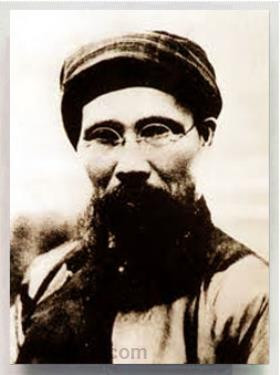 |
| Phan Boi Chau (1867 - 1940) |
Phan Boi Chau was born on December 26, 1867 in Dan Nhiem village, Nam Hoa commune, Nam Dan district, Nghe An province.He had a love for his country since he was young. At the age of 17, he wrote the "Proclamation to Binh Tay Thu Bac" and posted it on the banyan tree at the village entrance to support the Northern uprising against the French.
At the age of 19 (1885), he and his friend Tran Van Luong established the "Can Vuong Lions" team (more than 60 people) to fight against the French, but were terrorized by the enemy and had to disband.
After that, Phan Boi Chau went to Hue to teach. Because of his talent, the mandarins asked King Thanh Thai to remove his sentence. Thanks to that, in the next regional examination, in the year Canh Ty (1900), he passed the exam with the highest score (Gia Nguyen) at Nghe An examination school.
Within 5 years after passing the National Examination, Phan Boi Chau traveled all over Vietnam and made friends with patriots such as Phan Chu Trinh, Huynh Thuc Khang, Tran Quy Cap, Nguyen Thuong Hien, Nguyen Ham (aka Tieu La Nguyen Thanh), Dang Nguyen Can, Ngo Duc Ke, Dang Thai Than, Ho Si Kien, Le Huan, Nguyen Quyen, Vo Hoanh, Le Dai,...
In 1904, he, Nguyen Ham and about 20 other comrades founded Duy Tan Association in Quang Nam to drive out the French, choosing Ky Ngoai Hau Cuong De - a descendant of the Nguyen Dynasty - as the association's president.
In 1905, he, along with Dang Tu Kinh and Tang Bat Ho, went to China and then to Japan to ask for Japan's help to help Duy Tan Association expel the French.
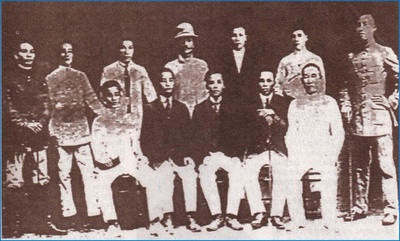 |
| Some overseas students in the Dong Du movement (1905-1909). |
In June 1905, Phan Boi Chau and Dang Tu Kinh brought back a number of books on the history of Vietnam's loss of the country. In August 1905 in Ha Tinh, he and the core comrades in the Duy Tan Association discussed and then came up with an action plan: Quickly send Ky Ngoai Hau Cuong De abroad; Establish farming associations, trading associations, and learning associations to gather the masses and to provide finance for the association; Select a number of intelligent, studious young people who could endure hardships and send them to study abroad.
In October 1905, Phan Boi Chau returned to Japan with 3 young men, and later 45 more people. In 1906, Cuong De went to Japan and was arranged to study at Chan Vo School. From then until 1908, the number of students studying in Japan reached about 200 people, living together in a disciplined organization called Cong Hien Hoi...
In March 1908, the "anti-tax movement" (ie the anti-tax movement in Central Vietnam) rose up in Quang Nam and quickly spread to other provinces. Suppressed by the French colonialists, many members of the Duy Tan movement and Duy Tan Association were arrested.
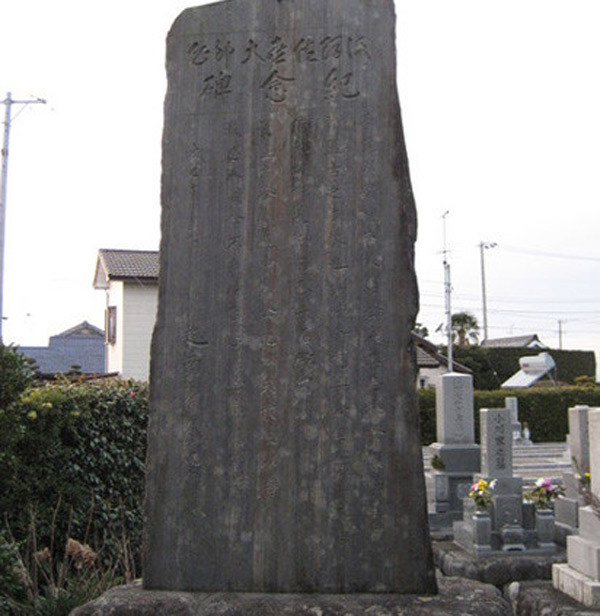 |
| Memorial stele erected by Phan Boi Chau in Japan to commemorate the contributions of his great friend Asaba Sakitaro. |
Before this loss could be overcome, two representatives of the association, Hoang Quang Thanh and Dang Binh Thanh, were captured by the French when they returned from Japan to Cochinchina to receive donations for the Dong Du movement. Next, France and Japan signed a treaty (September 1908), according to which the Japanese government ordered the expulsion of Vietnamese students from Japan. In March 1909, Cuong De and Phan Boi Chau were also expelled.
At the end of 1910, Phan Boi Chau transferred a large number of members (including about 50 young men) from Guangdong to build a base in Ban Tham (Siam). Here, they farmed together, studied and practiced martial arts to prepare for a future national restoration plan.
In the first week of May of the year of Nham Ty (June 1912), in the "Great Conference" at the ancestral temple of Liu Yongfu in Guangdong (China), a large number of delegates from all three regions decided to dissolve the Duy Tan Association and establish the Viet Nam Quang Phuc Association, that is, to change the motto from monarchism to democracy to expel the French army, restore Vietnam, and establish the Democratic Republic of Vietnam.
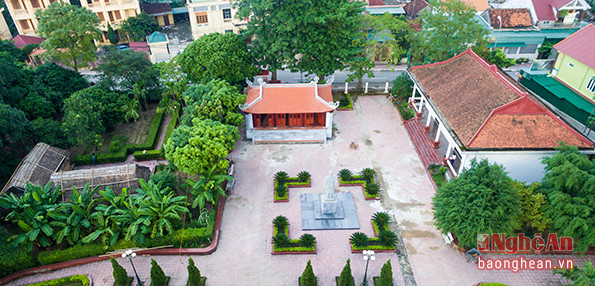 |
| Phan Boi Chau Memorial House in Nam Dan town will be inaugurated on October 29. Photo: Archive |
Despite the change in mission, Phan Boi Chau still maintained Ky Ngoai Hau Cuong De in the role of chairman of the provisional government of the Vietnam Restoration Association, in order to gain the support of the people in the country.
Afterwards, the Vietnam Restoration Association sent some members back to the country to eliminate some French officials and their powerful collaborators, in order to "awaken the people" and "call for the spirit of the country". Although the riots with bombs and grenades occurred sporadically, they still stirred up public opinion at home and abroad, causing the French authorities to increase their terror, resulting in many people being arrested and killed. Convicted of being the masterminds, Phan Boi Chau and Cuong De were sentenced to death in absentia by the French colonialists and the Southern Dynasty.
In 1913, the French colonialists sent people to Guangdong to “negotiate” with Governor Long Te Quang to arrest Phan Boi Chau and other important members of the association. On December 24, 1913, Phan Boi Chau was arrested. However, thanks to Nguyen Thuong Hien, who was in Beijing at the time, Long Te Quang could not hand him over to the French, but only imprisoned him in a Guangdong prison, until February 1917, when he was released.
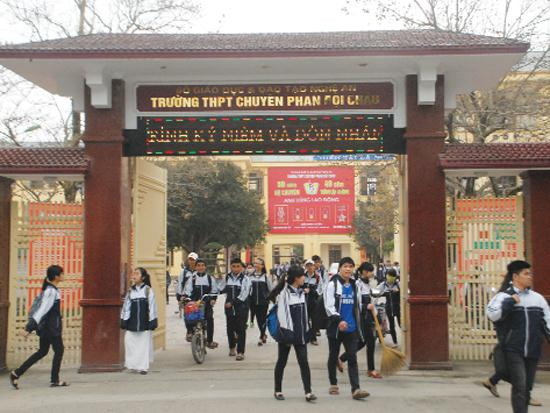 |
| Phan Boi Chau High School Nghe An. |
After being released from prison, Phan Boi Chau continued his revolutionary activities. In 1922, following Sun Yat-sen's Kuomintang, he planned to reform the Vietnam Restoration Association into the Vietnam Nationalist Party. With advice from Nguyen Ai Quoc (who was then a member of the Eastern Committee, in charge of the Southern Bureau of the Communist International), Phan Boi Chau planned to change his policy towards socialism, but before he could reform, he was kidnapped on June 30, 1925, and was taken back to Vietnam by French colonialists in Shanghai, sentenced to life in prison.
In the face of the nationwide people's struggle to release Phan Boi Chau, and thanks to the intervention of Governor General Varenne, he was allowed to return to Ben Ngu (Hue). In the last 15 years of his life, he (at that time called Old Man Ben Ngu) still maintained his noble character, constantly propagating patriotism through literature and poetry, so he was very loved by the people. Phan Boi Chau died on October 29, 1940 in Hue. Currently, his name has been given to a specialized school in Nghe An province, a large street in Hanoi and many streets and schools in provinces and cities across the country./.
Peace
(Synthetic)
| RELATED NEWS |
|---|
